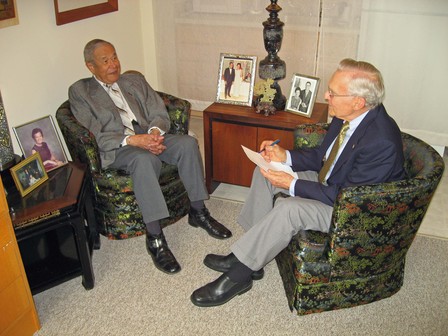Dr. Harry Groves, one of the first presidents of the Residents Association at Carolina Meadows, spoke to a packed house recently in the Gallery at The Fairways. His chosen topic was “Race in a Changing Triangle: A Memoir,” and he spoke from his personal experience in two separate sojourns in Durham: the first, two years of teaching law at North Carolina Central University, 1949-51.
Dr. Harry Groves, left, speaks with Paul Hardin. Photo by Joe Mengel.
Those of us in the audience who had known Durham in 1949-51 were amazed at the clarity of the verbal picture Dr. Groves painted of Pettigrew and Fayetteville streets, the three prominent black-owned and managed businesses near that intersection that set Durham apart from other North Carolina cities, and the impressive black residential section of Durham convenient to those businesses and to the College. He described in some detail two of the more prominent residences: the first, occupied by a medical doctor and his family; the second by a vice president of the North Carolina Mutual Life Insurance Company and his family. The larger of the two houses sold for $50,000, a stunning illustration of the low cost/value of real estate in that black neighborhood in the 1950s.
Other establishments of that time and in that part of Durham were a movie house, hotel, two doctors’ offices, one lawyer’s office, a beauty shop, a barber shop, and a cafe, which, Dr. Groves now recalls, served good meals to the all-black neighborhood. There was also a weekly newspaper that published news of interest to black persons, and even a hospital, Lincoln Hospital, then serving only blacks, now still in existence and serving as a clinic for poor persons of all races.
In that first period of the Groves’s residency in Durham, all neighborhood entertainment was in the homes of residents, since there was no access for blacks to public restaurants and other entertainment facilities. All black children went to the same school and their families to the same segregated churches. Neither Harry nor Evelyn Groves ever met in those days a white person who had education comparable to theirs, and there was virtually no social relationship between educated whites and blacks. Harry recalls that they had polite relationships with whites who worked at Sears or other stores and as service representatives in the telephone company and other utilities.
As noted earlier, Harry’s and Evelyn’s first stay in Durham was for only two years. They came back 23 years later to a very different Durham and in very different circumstances. Harry, who had had a distinguished interim career as a military and civilian lawyer, college dean, and college president, was now Professor of Law and Dean of the Law School at North Carolina Central University. Obviously, his access to both black and white communities in Durham was much better than in his days as a very young law teacher.
Durham had changed also. Central had become a significant institution, and that was both a cause and effect of easier social and educational relationships between educated blacks and whites in Durham. The elite homes along Fayetteville Street had become older, of course, but they had not become a ghetto. At Central, Dr. Groves continued his scholarly career, which now includes authorship of six books on constitutional law and more than 30 journal articles. He also holds the title of Professor Emeritus at UNC Law School.
Although Harry modestly did not mention it in his memoir, he is North Carolina’s most prominent legal expert on Continuing Care Retirement Communities. In the words of his friend Bill Aycock, Harry practically “wrote the book” on this industry of which Carolina Meadows is a sterling example. His legal expertise is only half of that story. He and Evelyn also had the experience of living in two such communities. They first moved into Carolina Meadows in 1989, later moved to a similar retirement community in the District of Columbia, remained there for several years, and, happily for us, came back to the Meadows in 2006.
The entire Carolina Meadows community was deeply saddened when Harry’s beloved Evelyn lost her battle with a long illness just a few weeks ago. Harry remains with us as a revered elder statesman, our most learned legal authority on Continuing Care Retirement Communities, and a man with countless friends and admirers.

From resident PR Committee member Paul Hardin
